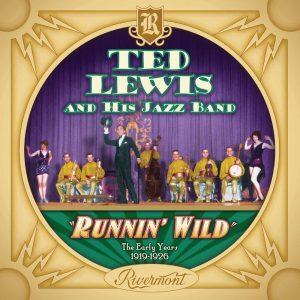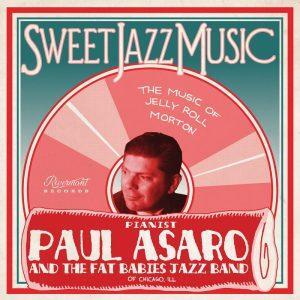Rivermont, under the direction of pianist Bryan Wright, has amassed a very impressive catalog filled with hot jazz, ragtime, stride and rag pianists, historic recordings and an extensive Big Broadcast series. Readers of The Syncopated Times owe it to themselves to explore the gems that they regularly release.
Ted Lewis Runnin’ Wild, The Early Years 1919-1926
 Ted Lewis occupies a unique place in jazz history. On the one hand, he became famous for his overly sentimental singing (which looked back nostalgically to a time period that never really existed) and his cornball clarinet and C-melody sax solos. On the other side, he often featured top-notch jazz musicians in his late 1920s/early ‘30s recordings including cornetist Muggsy Spanier, clarinetists Benny Goodman, Frankie Teschemacher and Jimmy Dorsey, and even Fats Waller.
Ted Lewis occupies a unique place in jazz history. On the one hand, he became famous for his overly sentimental singing (which looked back nostalgically to a time period that never really existed) and his cornball clarinet and C-melody sax solos. On the other side, he often featured top-notch jazz musicians in his late 1920s/early ‘30s recordings including cornetist Muggsy Spanier, clarinetists Benny Goodman, Frankie Teschemacher and Jimmy Dorsey, and even Fats Waller.
However Runnin’ Wild, The Early Years 1919-1926 casts a different light on Lewis and his music. Other than trombonist George Brunies, who does not appear until the 19th selection, there are no all-stars to be heard and Lewis only takes seven vocals. The emphasis is on his band (which ranged from six to ten pieces) and the leader’s playing in the ensembles and as a soloist. Many of these early performances will surprise those who have stereotyped Ted Lewis. While there are some rambunctious outbursts, his playing much of the time fits in comfortably with the hot dance music of the early 1920s. This was very much his time period and he fares quite well on such numbers as “The Hula Blues,” “Queen Of Sheba,” “Hot Lips,” “Runnin’ Wild” and “Tiger Rag.” The program also includes Lewis’ earliest versions of his signature song “When My Baby Smiles At Me” and “Blues My Naughty Sweetie Gives To Me.” A bonus is the six previously unreleased performances that were formerly in Lewis’ private collection. One comes away from this valuable “best of” collection with the conclusion that Ted Lewis was actually a better and more jazz-oriented musician in his early years than one would expect.
Runnin’ Wild: The Early Years 1919-1926 (Rivermont BSW-1164, 27 selections, TT = 80:08)
Ethan Uslan: By The Sea
 Ethan Uslan, who had recorded two previous CDs for Rivermont, is a classically-trained pianist who in college switched permanently to syncopated music. He plays both classic jazz and ragtime with equal skill and understanding. By The Sea is a set of wide-ranging piano solos that include such songs as “Chicago,” “Colonel Bogey March,” William Krell’s “Mississippi Rag” from 1897 (the first published rag), “Beer Barrel Polka,” “La Vie En Rose,” “Palesteena,” “Nagasaki,” and a jazz version of the very-familiar “Fur Elise.” Uslan’s playing is lively, contains many witty moments along with references to other songs and styles, and is often inspired by Fats Waller. Listening to his hot variations on “Nagasaki” makes one realize that he deserves to be recognized as one of the best in his field. I would love to hear him share the stage with Jeff Barnhart.
Ethan Uslan, who had recorded two previous CDs for Rivermont, is a classically-trained pianist who in college switched permanently to syncopated music. He plays both classic jazz and ragtime with equal skill and understanding. By The Sea is a set of wide-ranging piano solos that include such songs as “Chicago,” “Colonel Bogey March,” William Krell’s “Mississippi Rag” from 1897 (the first published rag), “Beer Barrel Polka,” “La Vie En Rose,” “Palesteena,” “Nagasaki,” and a jazz version of the very-familiar “Fur Elise.” Uslan’s playing is lively, contains many witty moments along with references to other songs and styles, and is often inspired by Fats Waller. Listening to his hot variations on “Nagasaki” makes one realize that he deserves to be recognized as one of the best in his field. I would love to hear him share the stage with Jeff Barnhart.
By The Sea (Rivermont BSW-2237, 21 selections, TT = 70:49)
Paul Asaro and the Fat Babies: Sweet Jazz Music
 Paul Asaro’s Fat Babies Jazz Band has emerged since its founding in 2010 as one of the finest classic jazz groups currently active in the U.S. Based in Chicago, the septet featured on Sweet Jazz Music is comprised of pianist-arranger Asaro, Andy Schumm on cornet and alto, clarinetist John Otto, trombonist Dave Bock, Jake Sanders on banjo and guitar, Beau Sample on bass and tuba, and drummer Alex Hall.
Paul Asaro’s Fat Babies Jazz Band has emerged since its founding in 2010 as one of the finest classic jazz groups currently active in the U.S. Based in Chicago, the septet featured on Sweet Jazz Music is comprised of pianist-arranger Asaro, Andy Schumm on cornet and alto, clarinetist John Otto, trombonist Dave Bock, Jake Sanders on banjo and guitar, Beau Sample on bass and tuba, and drummer Alex Hall.
A tribute to Jelly Roll Morton and his Red Hot Peppers, Sweet Jazz Music has plenty of variety. Seven of the 14 songs are transcriptions from the original recordings, with some melodic improvising taking place in the solos. “Black Bottom Stomp” is the closest rendition to the original record while “Doctor Jazz” is given a particularly rousing rendition. Someone should write vocalese to the opening trumpet solo (originally by George Mitchell); it would make a great song by itself.
However the most intriguing selections are the other seven. Five of the pieces have Asaro’s new band arrangements of Morton piano solos including “Freakish,” a polite “Tiger Rag” and “Spanish Swat” which includes some Latin rhythms. “Sweet Jazz Music” is based on a spontaneous fragment that Morton played on his Library of Congress recordings. “Croc-O-Dile Cradle” is the biggest find, a previously unknown Morton composition. Vince Giordano recently discovered two parts of the 1930 dance band arrangement’s sheet music, acquiring it for around $4. While not a classic piece, it adds to Morton’s huge musical legacy. New Jelly Roll Morton pieces are not exactly discovered every day (or even every decade).
The musicians know this music backwards. With Schumm (no Bix this time), Otto and Bock emulating but not copying George Mitchell, Omer Simeon, and Kid Ory, and Asaro playing variations on Morton, this is another successful and enjoyable Fat Babies project.
Sweet Jazz Music (Rivermont BSW 2238), 14 selections, TT = 48:12) www. rivermontrecords.com
This review first ran as part of Scott Yanow’s Nights at the Turntable column in our November 2016 issue.
Since 1975 Scott Yanow has been a regular reviewer of albums in many jazz styles. He has written for many jazz and arts magazines, including JazzTimes, Jazziz, Down Beat, Cadence, CODA, and the Los Angeles Jazz Scene, and was the jazz editor for Record Review. He has written an in-depth biography on Dizzy Gillespie for AllMusic.com. He has authored 11 books on jazz, over 900 liner notes for CDs and over 20,000 reviews of jazz recordings.
Yanow was a contributor to and co-editor of the third edition of the All Music Guide to Jazz. He continues to write for Downbeat, Jazziz, the Los Angeles Jazz Scene, the Jazz Rag, the New York City Jazz Record and other publications.























